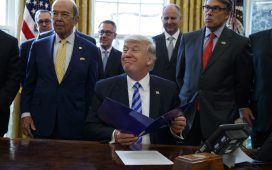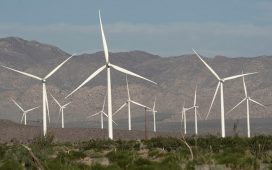With help from Zack Colman, Annie Snider, Eric Wolff and Ben Lefebvre
Editor’s Note: Morning Energy is a free version of POLITICO Pro Energy’s morning newsletter, which is delivered to our subscribers each morning at 6 a.m. The POLITICO Pro platform combines the news you need with tools you can use to take action on the day’s biggest stories. Act on the news with POLITICO Pro.
Advertisement
Listen to today’s POLITICO Energy podcast!
— A Super Tuesday match-up in an oil-soaked corner of South Texas is pitting a Green New Deal-backing progressive against one of the Democratic party’s most conservative lawmakers.
— Senate Energy Committee leaders unveiled their sweeping energy bill Thursday, teeing up floor debate next week.
— Energy Secretary Dan Brouillette told lawmakers Thursday that DOE has not started work on an interim nuclear waste storage site.
FINALLY FRIDAY! I’m your host, Kelsey Tamborrino. Check out the POLITICO Energy podcast — all the energy and environmental politics and policy news you need to start your day, in just five minutes. Listen and subscribe for free at politico.com/energy-podcast.
The League of Conservation Voters’ Tiernan Sittenfeld is the trivia winner. Tiernan correctly answered that the 63rd Congress was the first to have 435 members in the House. For today: Which president had the first telephone line installed at his desk in the Oval Office? Send your tips, energy gossip and comments to ktamborrino@politico.com.
EVERYTHING’S BIGGER IN TEXAS: An upcoming Super Tuesday primary vote in South Texas has become a proxy battle between Democratic leadership and the left wing of the party, Pro’s Ben Lefebvre and Anthony Adragna report. The match-up is between eight-term Democratic Rep. Henry Cuellar — who has been slammed as “Big Oil’s favorite Democrat” — and Jessica Cisneros, a Green New Deal-backing, 26-year-old immigration lawyer. The contest will also offer a preview of whether the kind of message that excites progressive activists — bans on fracking, phase-outs of fossil fuel, Medicare For All — could resonate in Texas if Sen. Bernie Sanders is the Democrats’ nominee in November.
Cuellar entered the final weeks with a $2 million war chest and the backing of House Speaker Nancy Pelosi and Majority Leader Steny Hoyer. And he’s supported by some groups that usually back GOP candidates: the U.S. Chamber of Commerce and the billionaire Koch family’s LIBRE Initiative Action, a Hispanic-focused libertarian group that hailed Cuellar as “the model of what an effective congressman should look like.”
Cisneros meanwhile has raised more than $1.3 million by Feb. 12 on the back of endorsements by Sanders, Sen. Elizabeth Warren, Rep. Alexandria Ocasio-Cortez and the progressive activist group Justice Democrats. In addition, the liberal super PAC Texas Forward has funded $1.2 million in ads on Cisneros’ behalf. Progressives see the outside support for Cisneros as a clear indication the race will be competitive, Ben and Anthony report.
Cisneros acknowledges that a climate-focused pitch in the Eagle Ford Shale region that has been at the center of the boom in U.S. oil and gas production is a hard sell. But instead of calling for a phase-out of fossil fuels, she’s adapted the Green New Deal message to the district’s culturally conservative voters. “We’re unpacking what it means: Investment in solar and wind and infrastructure more than anything, and what jobs that could create for the people here,” she said. “Jobs are what excites people.”
ENERGY BILL FINALLY HERE: Pulling from numerous existing proposals ranging from energy efficiency, carbon capture and storage, Energy Chairman Lisa Murkowski and ranking member Joe Manchin released their long-awaited energy bill on Thursday, Anthony reports.
The measure marks the latest attempt to pass sweeping energy legislation after more than a decade of inaction on Capitol Hill. And, already, the bill is set to see floor debate next week. Majority Leader Mitch McConnell on Thursday filed cloture to proceed to S. 2657 (116), the legislative vehicle for the bill and a procedural vote is scheduled for 5:30 p.m. Monday. Murkowski is skipping an Energy Committee markup because the panel has already separately advanced dozens of individual bills that went into the package.
What’s in it? The bill largely avoids the question of how to reduce carbon emissions from fossil fuels that are driving climate change, but its sponsors — who hail from states that are major producers of oil, natural gas and coal — say its focus on narrower consensus policies will spur the development of new technologies needed to bring down greenhouse gas emissions.
Language in the measure boosts development of energy storage technologies, expedites approval of small exports of liquefied natural gas, creates new programs aimed to boosting carbon capture and sequestration technologies, reauthorizes the Advanced Research Projects Agency-Energy through fiscal 2025 and boosts nuclear energy programs.
“What we have focused on is a recognition that the technology and the innovation that drives us in this country in the energy space can every day bring us to a better place when it comes to better emissions, smaller footprints and cleaner operations,” Murkowski told POLITICO.
BROUILLETTE OFFERS FEW DETAILS ON YUCCA: Energy Secretary Dan Brouillette told lawmakers the department has not yet started evaluating alternatives to the Yucca Mountain nuclear waste site, Pro’s Eric Wolff reports. Brouillette previously told reporters the administration would form a working group to develop “creative” solutions toward interim storage. However, DOE has not yet started work on the project, Brouillette told appropriators. “We will wait for approval from Congress to begin that,” he added.
Now, let’s talk home improvement: At the tail end of Thursday’s hearing, Rep. Marcy Kaptur implored Brouillette to think about ways to make DOE an attraction worthy of its location across the street from the National Mall and the Smithsonian Air and Space Museum. The 1960s era James Forrestal building has long had a reputation for unattractiveness. One DOE staffer told ME, “I love when I walk out for lunch and I hear the Segway tour guides refer to DOE as ‘the ugliest building in Washington.'” Kaptur proposed creating an exhibit that would welcome students visiting D.C. and collaborating with the Smithsonian or private entities to make it more welcoming. And she offered her services as an ally with the General Services Administration for a larger scale renovation. “I just think it’s time for a little refurbishment,” she said. “For inspiration for the country.”
WIPP expansion complete in 2022: Brouillette assured Rep. Mike Simpson (R-Idaho) that the expansion of the Waste Isolation Pilot Plant in New Mexico would be completed in 12 to 15 months. The plant will continue to take shipments of Idaho’s transuranic waste while construction is ongoing.
DAM REVIEW COMING: The Trump administration is expected to release today a new draft environmental impact statement for the system of federal dams along the Columbia River and its tributary, the Snake River. The dams produce nearly half of the nation’s hydropower but also serve as major impediments for fish, including endangered salmon. Environmental groups have targeted four of the dams on the lower Snake River for removal — an option fiercely opposed by Republican lawmakers in eastern Washington, including Reps. Cathy McMorris Rodgers and Dan Newhouse, who have won backing from the Trump administration.
Greens, who won the environmental review as part of a 2016 court ruling, are already panning the new environmental review. “At this critical point, when what were the world’s most abundant salmon runs are nearing extinction, what we need are new solutions, not a repackaging of previous strategies that clearly haven’t, and won’t, deliver the recovery of salmon,” said Tom France, the National Wildlife Federation’s regional director for the Pacific Northwest.
CONFLICT QUESTIONS SURROUND CEQ COUNCIL: White House Council on Environmental Quality general counsel Viktoria Seale faces fresh conflict of interest questions surrounding her family trust’s ownership of Exxon Mobil stock, watchdog group Accountable.US alleged in research shared with ME. The claim stems from a Bloomberg Environment report that showed her husband, John Seale, lobbied CEQ for the American Chemistry Council. The group contends that means Seale’s husband indirectly lobbied for Exxon Mobil, which is an ACC member, and that Seale has a conflict of interest because the oil and gas giant has a stake in Double E Pipeline LLC, which is undergoing a National Environmental Policy Act review.
Dan Schneider, a CEQ spokesman, told ME John Seale “never lobbied CEQ either directly or indirectly, nor is NEPA a part of his portfolio at ACC.” Viktoria Seale, he said, never met with ACC or had any involvement with the pipeline. “Mrs. Seale takes her ethical obligations seriously and is in full compliance with her waiver.” Schneider added. “Any suggestion to the contrary is patently false.” Seale got a waiver to hold those stocks and work with those companies on NEPA issues when she was appointed in 2017.
But Chris Saeger, director of strategic initiatives with Accountable.US, said the new information about her connections to Exxon via ACC through her husband’s lobbying “makes this doubly troublesome.” Saeger added: “Until she or CEQ provide evidence to the contrary, for all we know she is re-writing NEPA to pad her pockets.”
SANITIZED: EPA Administrator Andrew Wheeler told reporters Thursday that his agency is playing a role in the Trump administration’s coronavirus response since EPA’s chemical safety office regulates disinfectants. Wheeler said the assistant administrator for that office, Alexandra Dunn, is participating in interagency meetings and is charged to “make sure that disinfectants are approved and ready to be used in the event of any incidents here in the United States and to make sure that we have the latest science to address the issue.”
UNDER REVIEW: Wheeler has also instituted a new policy giving the chairman of the Science Advisory Board the power to decide when the influential group will review agency rules, Pro’s Alex Guillén reports. Under a Feb. 25 memo, the SAB chairman — currently, Michael Honeycutt, the Texas Commission on Environmental Quality’s top toxicologist who was appointed by former Administrator Scott Pruitt in 2017 — will decide whether SAB should review a proposed rule following a monthly briefing by Wheeler and EPA experts on its rulemaking actions. “No further action will be taken on those proposed regulatory actions that the chair determines do not merit further SAB review,” the memo said.
SEC CHARGES SCANA, EXECS: The Securities and Exchange Commission charged South Carolina utility SCANA Corp., its subsidiary and two former executives with defrauding investors by making false statements about the now-defunct V.C. Summer nuclear project, Pro’s Gavin Bade reports. The complaint alleges that SCANA, former CEO Kevin Marsh, former Executive Vice President Stephen Byrne and its utility subsidiary South Carolina Electric & Gas misled investors by telling them construction of the plant was on track when they knew it was “far behind schedule” and unlikely to meet the deadline for crucial federal tax credits.
HOUSTON IN THE TIME OF CORONAVIRUS: Organizers for the annual weeklong CERAWeek energy conference in Houston said the coronavirus pandemic will not prevent the conference from going on, but it has already cut into planned attendance. “Delegates from China will not be able to attend this year’s conference due to travel measures already in place in the United States,” the event organizers noted on their website. The conference, scheduled to start on March 9, attracts attendees from energy companies and governments around the globe, with PetroChina, Sinopec and Chinese government officials normally a big part of the crowd.
— “‘I can’t even’: Emails reveal EPA officials’ reaction to Trump rant on toilets, showers,” via NBC News.
— “Trump ready to end Chevron’s sanctions waiver in Venezuela,” via Bloomberg.
— “Many miners die, and it never shows up in safety data,” via The Wall Street Journal.
— “Oil companies can’t accurately locate polar bear dens in the Arctic. That could be grave for mothers and cubs,” via The Washington Post.
— “Broadcast news networks paid more attention to climate change in 2019,” via The Verge.
— “Dunleavy administration considers hitting back after JPMorgan’s anti-Alaskan’ move to halt Arctic oil investment,” via Anchorage Daily News.
THAT’S ALL FOR ME!








